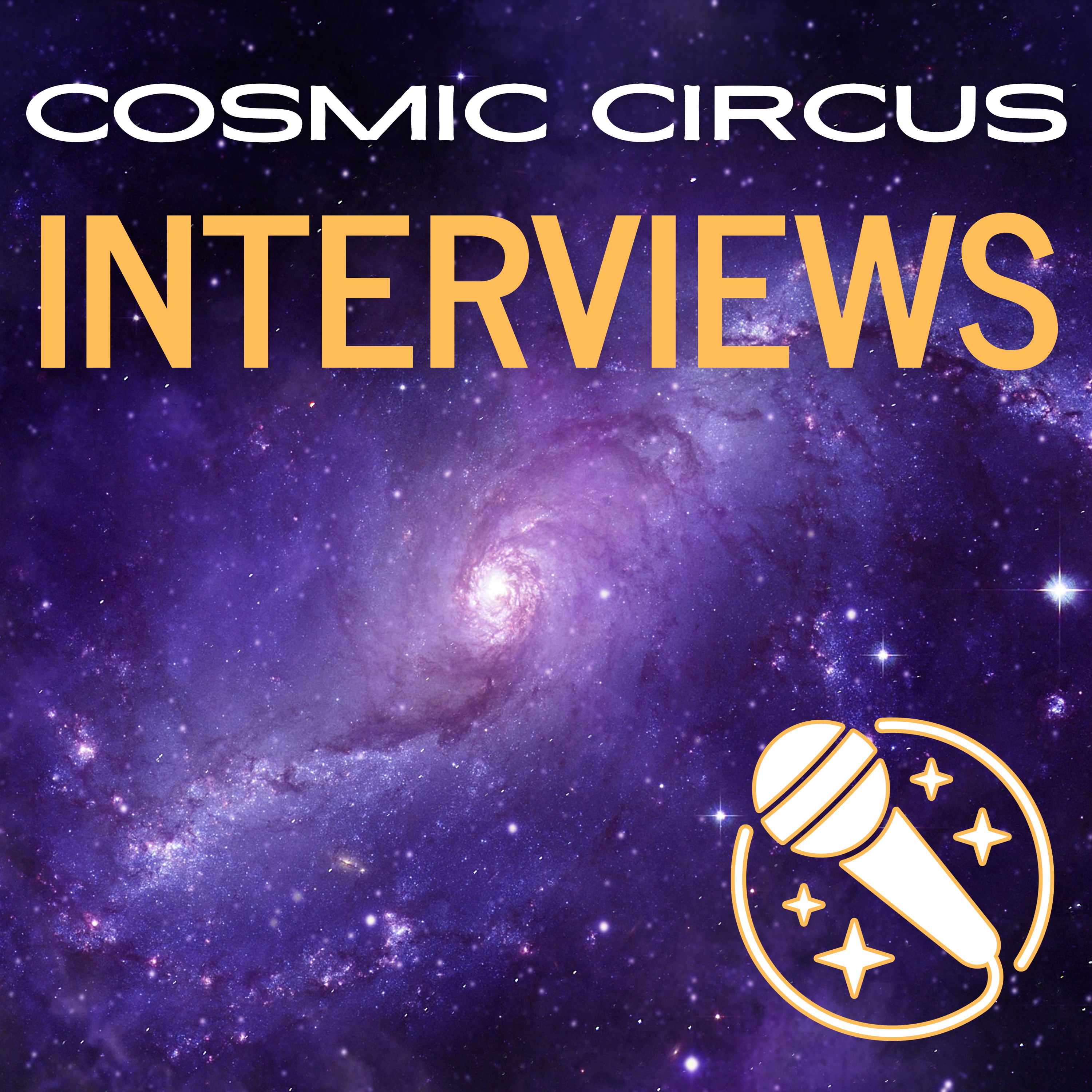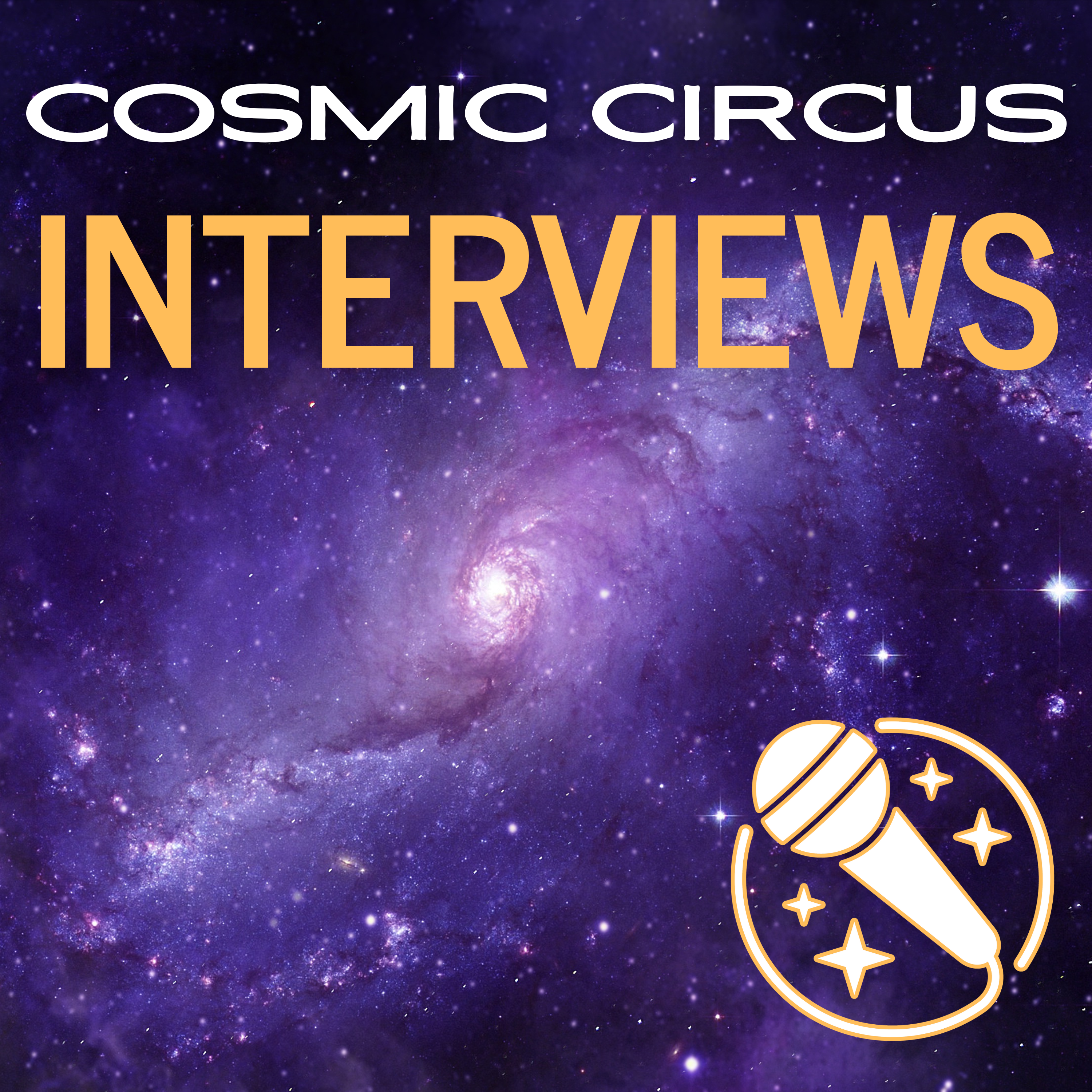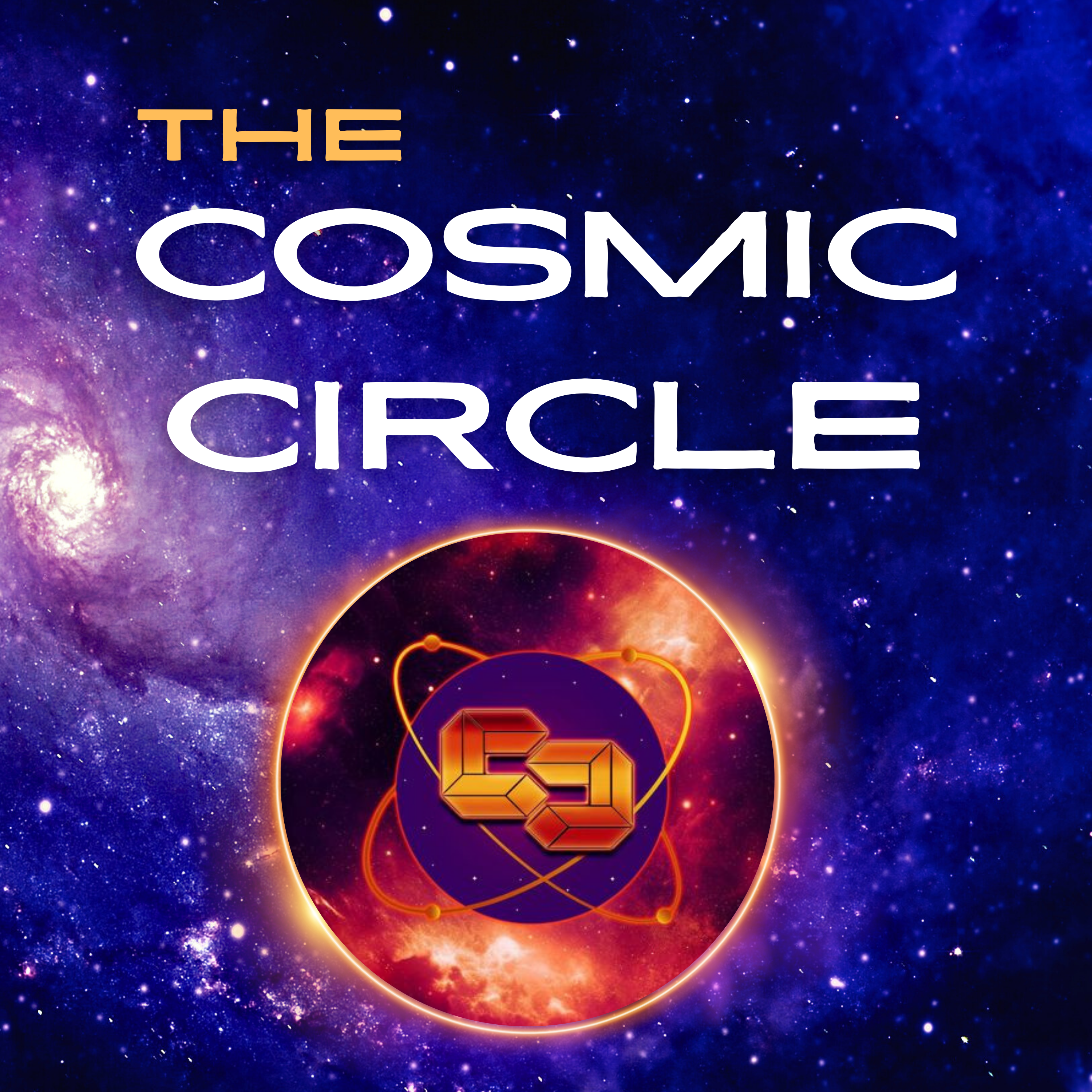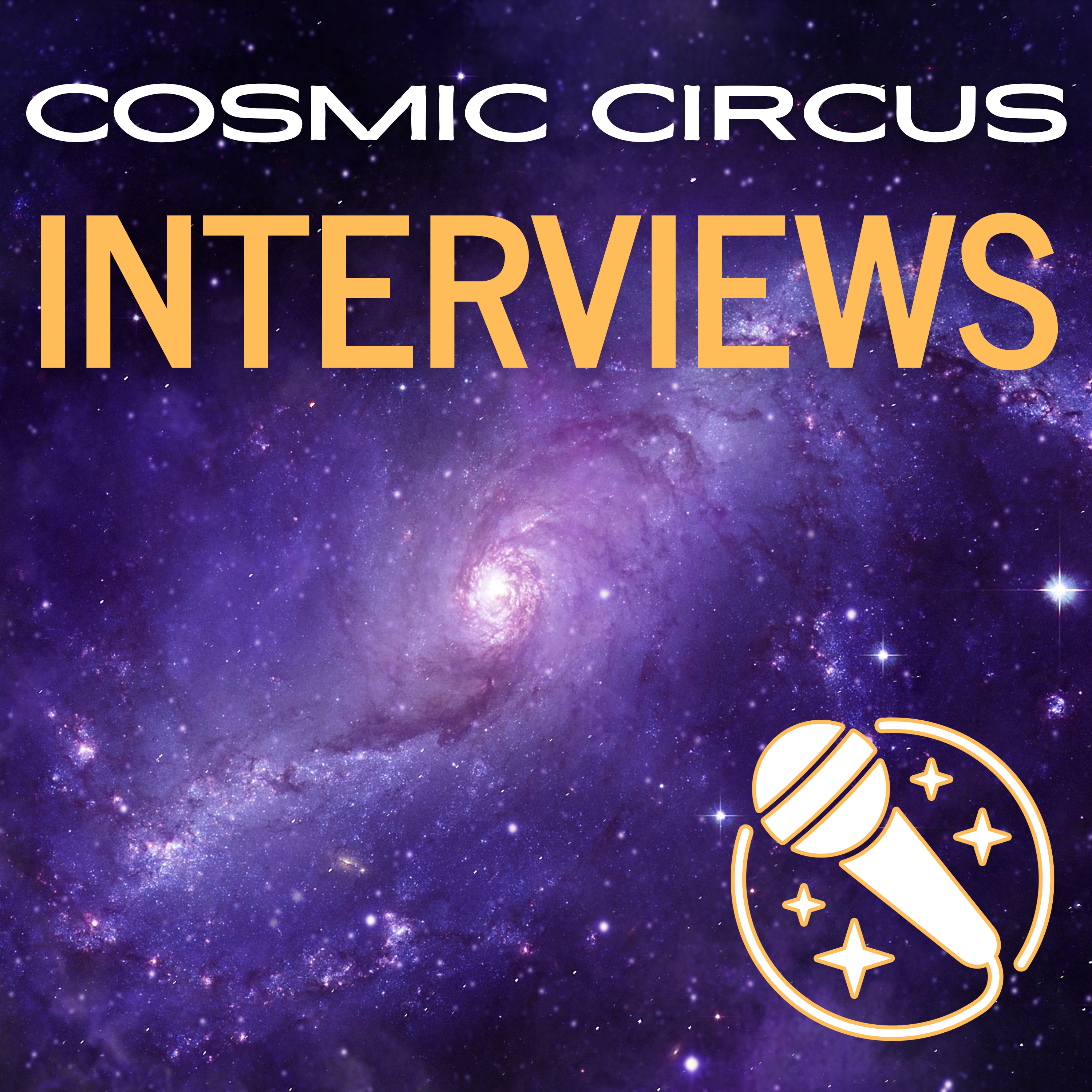[00:00:00] Speaker A: Welcome to the Cosmic Cafe, the companion podcast to the Cosmiccircus.com. I'm Brian Kitson and we have an exciting interview for you today. Thorns is a new horror film from director and writer Doug Scholes and stars horror legend Doug Bradley. I had the chance to speak with both of them before the premiere of the film. In the interview, Scholes and Bradley discuss the process of bringing this film to life, from the writing to the design and challenges and excitements from working on thorns. Enjoy.
[00:00:35] Speaker B: Thank you so much, you two, for being here today and letting me interview you. I was able to watch the film the other night.
I was really excited to watch it. I actually watched it twice now.
[00:00:47] Speaker C: Wow.
[00:00:48] Speaker B: Yeah, I enjoyed it a lot and I'm excited for seeing it tomorrow as well. But to begin, I was wondering if you both could kind of tell me, non spoiler, obviously, but kind of tell me what the film is about and kind of what it means to us for this movie.
[00:01:06] Speaker D: Okay.
[00:01:07] Speaker C: The author speaks.
[00:01:09] Speaker D: Sure. The story is about a former priest now working for, we'll just say, NASA for the interview, who's sent to investigate a remote space observatory that's gone offline after receiving a mysterious signal from deep space. And along the way, it becomes a horror film very quickly.
[00:01:41] Speaker B: Absolutely.
It started off with the Sci-Fi feel and it switched very quickly to horror. And that was kind of a cool genre melding that I enjoyed quite a bit.
[00:01:52] Speaker C: Cool.
[00:01:53] Speaker B: Well, thank you.
You both wrote this and directed this film.
How did the concept kind of come to be for you?
[00:02:05] Speaker D: The concept could be traced back to just a love and affinity for a specific area of cinema where I guess I found myself going to the cinema a lot. I was in high school and it was in the saw a lot of great physical effects, makeup effects driven movies that weren't computer generated images. And when I was trying to plot out what I wanted to do next, I thought, why not revisit that era and try and kind of create a bit of an homage, a bit of a retro feel, but still tell a modern story. So I think the modern Elements come when we're trying to meld science and religion.
Not that those are modern topics, but you know what I mean.
[00:02:59] Speaker B: Absolutely.
One of the things I noticed is that we kind of always have this war between religion and science, and this film explores that quite a bit.
I liked that you don't quite see that intersection quite so much in this way. It was like a new take on that subgenre.
[00:03:17] Speaker C: Sure.
[00:03:20] Speaker B: So for you, Mr. Bradley, you're a horror legend.
Hellraiser, is something that I didn't grow up on it. My mom wouldn't let me watch horror films growing up. But as a teenager and adult, you were someone that was on my screen. What kind of drew you to this film?
[00:03:41] Speaker C: The script, which is always the starting point.
My agent contacted me.
Here's an offer, here's a script. Take a look, let me know. That's where we always start from.
He had had a client work for Doug previously, so he was vouching for him because it's a slightly different setup, because Doug. Well, he'll be able to explain it better than. Better than I because he has this home base here, which is an educational institution.
Would that be a word?
I was going to say, it sounds a bit grim. I'm sure it isn't.
And Doug himself says that's his day job, and at the weekend, he's an independent filmmaker. So it's an unusual kind of setup. But as I say, my agent was vouching for his bona fides, so that was all it. So then it is the script, and it's a well written script.
They aren't all an intelligently written script. And everything that's already been talked about, the interface between science and religion and exploration of outer space and exploration of inner space, and then the levels of. It's interesting. You hear quite often these days people criticizing for science, for having become in some ways a religion, and you hear people talking about the scientific consensus. We heard a lot through the pandemic and the lockdown about scientific consensus.
Now, to me, consensus doesn't exist in science, because science is not about belief.
Science is about observation and experiment.
And if science establishes that something appears to fit the experimental picture, and then somebody comes along with some new evidence that seems to suggest a different picture, science embraces the difference and moves on, whereas religion remains entrenched in its fundamentalism.
There is a truth, which was a truth and is a truth and will always be a truth, and you can't challenge it and you can't break it.
So all of that was intriguing me.
Plus, it's an apocalypse movie that can only be a good. And I was also being intrigued by my own character, Archbishop. We established now that he is Archbishop Jenkins, who, as Doug said, has been attached to the space agency as a kind of theological spiritual advisor, which seems slightly strange.
He says, who better than a man of the cloth who know in touch with the bigger issues to deal with a subject like that? It may sound a bit questionable and there may be reasons for having your doubts about Archbishop Jenkins, but I couldn't comment on that, really. So it's all that and then even beyond that. And again, I don't want to go into spoilers, but with stuff that my own character has to say later.
There's also that element which is actually present in Hellraiser of is there a hell? And if there is a hell, where is hell?
And is there a place? Is there a physical place? Or is it a place that we create for ourselves?
I think it's. John Milton's lines always sum it up best. I'll paraphrase horribly, I've no doubt. So apologies to Mr. Milton if he's listening, but I think it's actually the introductory quote to Paradise Lost, to the effect that the mind is a place entire unto itself and can make a heaven of hell or a hell of heaven.
I think we get some of that into play in the movie, so there's a lot going on. Plus there's a monster.
[00:08:57] Speaker B: Something you said there.
[00:09:00] Speaker C: We all love nuns.
[00:09:03] Speaker B: Absolutely. Something you said there, though, is that this movie does really make you think at the end of this, you're constantly thinking about the concept of hell and hell.
Don't want to say too much, because people need to go see this movie. But I did. I was thinking about it even this morning. I was preparing. I was like, man, this just can't get out of my head. So it's cool to kind of see that play out throughout the know. Archbishop Jenkins kind of shows up kind of like a connective tissue through the film, but it's a lot of like, on screens and interactions through that. Was there any challenges? Because it seems like maybe we are not physically in these scenes with these people, but you're also interacting and you're giving the emotional connection with these individuals. Was there any challenges to filming it that way?
[00:09:55] Speaker C: For me, honestly, yes.
I much prefer interacting. Acting is interaction, acting is reaction.
But I was playing, there's a lengthy piece in a confessional, which is slightly different, but otherwise I'm playing most of my stuff straight to camera, and that's a different kind of discipline.
It's not easy, and I much prefer being around other actors, which I never was.
[00:10:43] Speaker B: I can understand feeding off to myself.
So, Mr. Schultz, you have this 80s style for the film, a lot of practicals. How was it creating the design for this monster? Because it's very unique. It has religious based appearances. It also reminded me, I don't know if you're a doctor who fan, but it reminded me a little bit of the silence which I really appreciated. But how did that come to, like, the use of practical effects and the monster?
[00:11:18] Speaker D: Yeah, well, we'd have to credit Dan Phillips, who's a local Michigan makeup artist. And so Dan got the script early on, and we met and we brought in an illustrator to do concept sketches. And we began to move a bit away from how the creature was written on paper, and sort of the themes of the film began to take on a life of their own.
So at one point we said to the illustrator, well, let's just go to this far end, and what would we come up with? With almost a literal type of translation.
Hence we began playing around with images of thorns that pertain to the story in the film. And it just sort of grew from there. Quite honestly, it became very natural.
But Dan had a big hand in helping that vision come to be. And all great films, I think, share the same philosophy, and that is the technicians and as well as the cast all need to be brilliant.
So you surround yourself with very good people and you've got a better shot at seeing your vision come to fruition in the way you might like.
So great kudos to Dan and his team for that.
[00:13:00] Speaker B: Yeah, it looks absolutely brilliant on screen. So that's know, and again, being kind of a local guy here in Michigan, getting to have the people that are more local work on that as well is fantastic.
What was it like shooting in Michigan for you? I think that we used to have a bigger film industry, and then it kind of died down when the tax incentives kind of disappeared. So I guess what is it about Michigan that you feel other people maybe should start looking towards our state?
[00:13:32] Speaker D: You know, before the know, Michigan was still, and still kind of is a thriving spot for industrial and different types of film. Right. And then, of course, we've got the automotive giants here and all that commercial work that even though a lot of the running footage is shot in middle America, the producers are still here in Detroit and the ad agencies. And so all that's conceptualized here in our state, the incentives sure brought some big Hollywood films here that never would have.
But either way, we were just talking between interviews.
If you travel up to the Taquamana Falls, where the rivers run copper colored, or if you head down to the salt mines in Detroit City.
Yeah, there are salt mines below the city.
[00:14:33] Speaker C: In the city?
[00:14:34] Speaker D: Yes, below the city streets and Google and see a lot of pictures. But Michigan has a vast resource for art, production design and location abilities. And so Michigan is a great place to make movies, and I've wanted to make films since seeing 2001 A Space Odyssey as a kid, but I never wanted to relocate to LA.
I like it here in Michigan.
[00:15:07] Speaker C: I just love the cold. Huh.
[00:15:10] Speaker D: And I complain daily about the weather. So there you go.
[00:15:15] Speaker B: That's part of being living in here. We don't like the weather, but we love the season. Yeah.
[00:15:21] Speaker C: I live just outside Pittsburgh now, so I'm on the same.
[00:15:26] Speaker B: Do you understand?
[00:15:27] Speaker C: I do.
[00:15:30] Speaker D: Will be set in the Caribbean.
[00:15:35] Speaker B: So I guess final question for both of you is, I guess if you were to, we want people to come to see this, obviously, and it's a great film. And how would you, how would you sell it to someone who's maybe not into or just getting into horror?
What would you want them to know about the film?
[00:15:59] Speaker C: Wow.
First, go ahead. I have no idea.
[00:16:08] Speaker D: Well, what I'm going to focus on real quickly.
I think Doug will answer the question better than I would. But I do want to be clear about tomorrow is the premiere, but the film releases nationally starting on the 23rd, which is the Friday from now. So February 23, you'll be able to find it in imagine theaters around Michigan, out in Kansas City and in San Diego as well. But then March 13, the film is going to expand to more cities.
So it's not just about, obviously, our big red carpet, the 23rd and so forth. But why go see this film?
Did you come up with a response?
[00:17:03] Speaker C: Well, all the elements that we talked about already really, that come together in this film, you're going to see an intelligently written plot, very well directed and well performed movie with some cool special effects and a strong story, which, as you have said, is going to stay with you and will maybe a little bit of a brainworm. The other thing I would say know Doug's talking about the movie expanding and getting a wider release.
The more people turn out to see this film locally on its initial release, the more, and the wider that is going to happen, and that gives more power to elbow down the line, and that's going to help more independent filmmaking in Michigan.
And also, as I've said, I think what Doug has achieved here on limited resources is remarkable. And at a time when movie making is being dominated by the eye popping budgets that the big studios are spending on movies and when they also largely control the distribution, for Doug to get this movie into theaters at all, I think is a remarkable achievement and credit to imagine for getting behind that and helping to push that. So if you turn out to see this film in theaters, you're striking a blow for the little guy.
And I think that's important too.
[00:19:01] Speaker B: That was said beautifully, and I can't think of anything better to end this on. Thank you, too, so much for spending the time with me, and I look forward to seeing it again tomorrow. And absolutely everybody should go see this film when it's in theaters because it deserves all the recognition that it's going to hopefully get. So thank you so much.
[00:19:19] Speaker D: Cheers.
[00:19:19] Speaker C: You're welcome. Thank you, thank you.
[00:19:22] Speaker A: Thank you for listening to this episode of the Cosmic Cafe. You can find the companion article for this podcast, along with all the other news for those who like superheroes, science fiction and fantasy films, tv shows and other
[email protected]. Have a great day.



